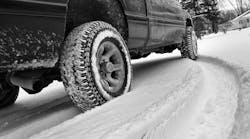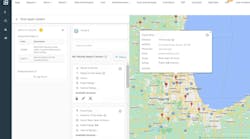By Neil Hoff, CHS product marketing manager for refined fuels
Tip 1: Treat the fuel.
When preparing your fleet for winter, one of the most commonly overlooked items is the fuel itself. Fuel needs to be winterized, especially for trucks that are used throughout the winter.
Paraffin wax is present in all diesel fuels as a natural lubricity agent. Like any wax, as the ambient temperature of the fuel drops, the wax begins to form large square-shaped structures. These can come out of suspension and cause fuel to gel, which clogs the fuel filter.
To prevent gelling, use a cold-flow improver (CFI) that includes de-icers and wax anti-settling agents, which extend the operability of the fuel. But don’t overtreat. Additional treatments of CFI are more likely to inhibit the fuel’s performance than help.
A second option is to use a diesel fuel specially formulated for low temperatures, such as Cenex® winterized premium diesel fuels. Cold-flow improvers, de-icers and wax anti-settling agents are included in the additive packages for these fuels.
Tip 2: Drain the water separator and replace filters.
Water in the fuel system can reduce engine performance and damage components like fuel pumps and injectors. Avoid these issues by replacing water-absorbing filters and draining the water separator regularly. Fuel gelling can be an issue, but it’s water turning to ice in fuel storage tanks and filtration that typically plugs filters during the first couple of cold snaps.
Fill fuel and hydraulic oil tanks full to prevent condensation from forming during temperature and humidity changes.
Tip 3: Check the coolant system.
Regular preventive maintenance will reveal any issues before they become major problems. Check for radiator leaks, plugged or hardened hoses and cracked belts. Tighten any loose hose clamps. Check coolant levels and antifreeze strength.
Tip 4: Prepare the battery.
Old Man Winter can drain batteries quickly. If a battery is close to the end of a typical 48- to 72-month cycle, replace it. Clean battery terminals, and be sure connections are tight. If equipment will be stored over the winter, disconnect battery ground cables to prevent battery drain.
Tip 5: Clean and inspect the exterior.
Use a high-pressure washer to remove dirt, dust and residue, and grease unpainted metal parts to protect them from the elements. Then apply a wax to the surface, which will help repel snow, salt and road chemicals. Use a lanolin-based spray-on protectant to prevent rust and corrosion.



